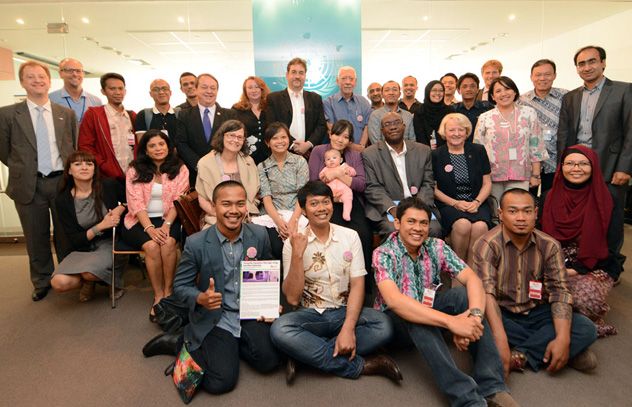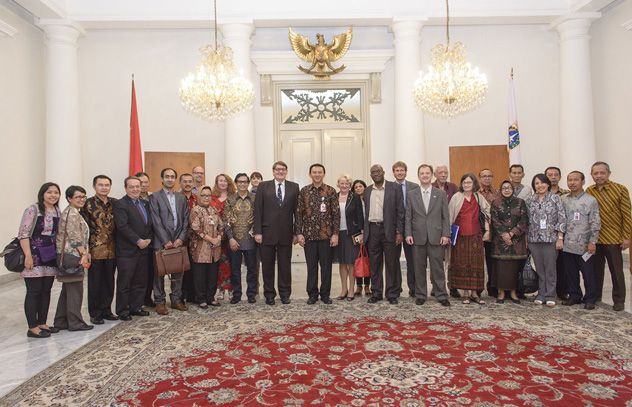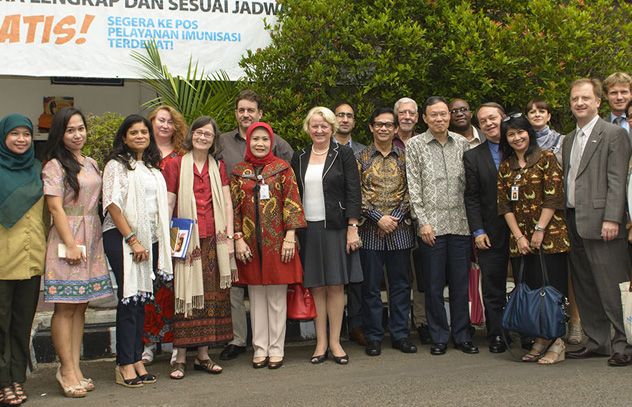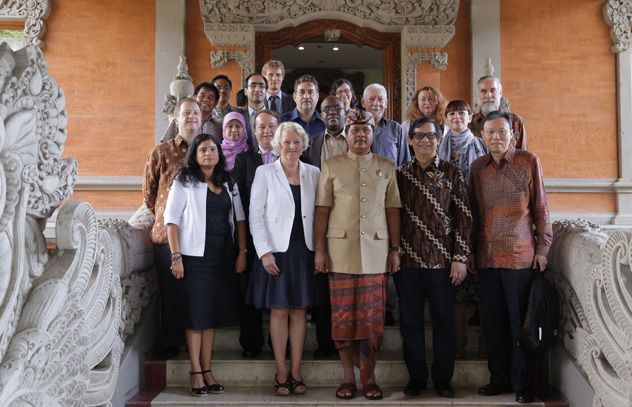




Feature Story
Leadership and focus on key affected populations frame Indonesia’s response to HIV
27 October 2014
27 October 2014 27 October 2014A delegation of the UNAIDS Programme Coordinating Board (PCB) conducted a field visit to Indonesia from 22 to 24 October to see how the country has implemented an integrated and decentralized response to AIDS that has accelerated the strategic use of HIV treatment, increased testing and counselling and strengthened HIV prevention services for key populations.
Indonesia demonstrates how a multisectoral approach to HIV, combined with consistent leadership at all levels, is helping the country to stabilize the epidemic, accelerate treatment and provide innovative and comprehensive HIV services. The country’s AIDS response is guided by an investment strategy, developed with support from UNAIDS, which focuses resources and efforts where they are most needed.
“Indonesia’s response shows that cross-sectoral engagement and leadership—including impressive and vibrant civil society involvement—is critical for turning strategies into action,” said UNAIDS Deputy Executive Director Jan Beagle, who was leading the visit. “As we look towards ending the AIDS epidemic by 2030, continued commitment at all levels will be key to effective impact—for AIDS and the broader health and development agenda.”
According to national estimates, 638 000 people are living with HIV across Indonesia, and latest national data show that new infections are stabilizing, although there are increases among men who have sex with men. Indonesia’s epidemic is largely concentrated among key populations, including sex workers and their clients, men who have sex with men, people who inject drugs and transgender people. While national HIV prevalence is low, a higher burden of HIV is found among key populations and in certain geographic areas, such as urban settings and in the Papua provinces.
Indonesia’s response shows that cross-sectoral engagement and leadership—including impressive and vibrant civil society involvement—is critical for turning strategies into action
Jan Beagle, UNAIDS Deputy Executive Director
The delegation, which included members from Australia, Brazil, El Salvador, Iran (Islamic Republic of), Luxembourg, Ukraine and Zimbabwe, as well as the PCB NGO delegation and UNAIDS Cosponsors, met with a range of national partners, including senior government representatives at the national, provincial and city levels, the National AIDS Commission, development partners, civil society organizations and the United Nations Country Team. The delegation also visited several sites to see examples of scaling up access to HIV testing and treatment and ways of addressing stigma and discrimination.
During a meeting with the PCB delegation, the Acting Governor of Jakarta, Basuki Tjahaja Purnama, highlighted the city government’s response to HIV in the capital. The Acting Governor underscored the significant investments that the local government has made to HIV programmes, including increasing access to HIV treatment, and expressed his commitment to prioritize health, education, employment and housing for people living with HIV, ensuring that no one is left behind.
Over the past years, Indonesia has increased its domestic financing to 42% of its total spending on AIDS. Throughout the visit, political commitment to further increase domestic funding was emphasized at all levels. However, government officials also stressed that international financing remains critical to scaling up the response, in particular for accelerating access to HIV treatment.
Community-friendly services key to a sustainable response
At a gathering of civil society groups, including networks of people living with and most affected by HIV, the delegation was presented with an overview of how youth organizations are mobilizing young Indonesians, as part of the ACT 2015 initiative, to ensure that HIV and sexual and reproductive health and rights remain a priority for the country’s new government and in the next development era.
Site visits to a number of public and private HIV service-providing institutions in Jakarta and Denpasar showcased how community-friendly and community-led services are improving uptake of services and reducing stigma and discrimination. Examples included the country’s main HIV treatment referral hospital in Jakarta, which runs programmes to sensitize staff on the specific needs of key populations at higher risk, and the Yayasan Kertipraja Foundation and the Bali Medika Clinic in Denpasar, where a number of programmes are led by key populations and provide easy-to-access services after work hours and on Saturdays. As well as increasing demand among key populations, such programmes have also led to early uptake of HIV treatment. The National AIDS Commission, with support from UNAIDS, is looking at how to further replicate and scale up such models across the country.



